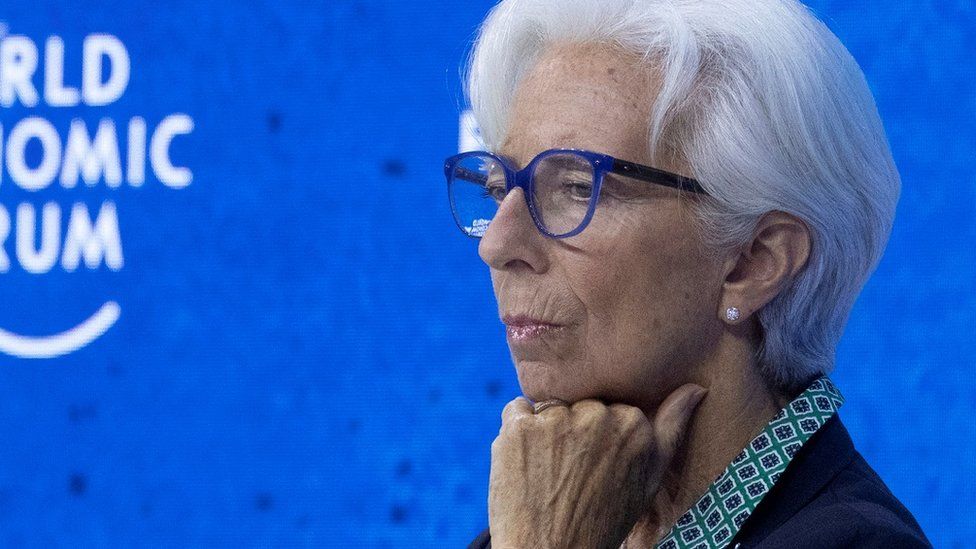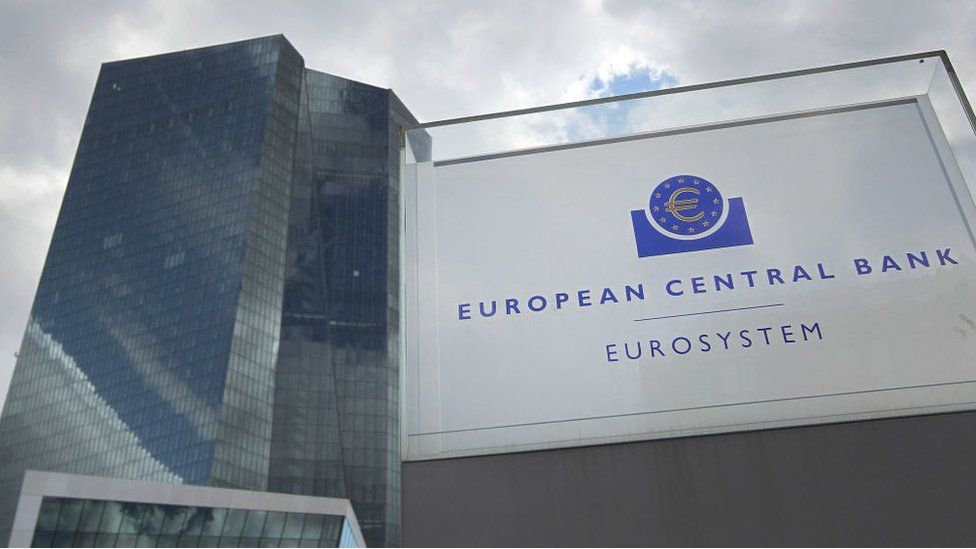
The European Central Bank (ECB) has raised interest rates for the first time in more than 11 years as it tries to control soaring eurozone inflation.
The ECB increased its key interest rate by 0.5 percentage points to 0.0% and plans further hikes this year.
The rate has been negative since 2014 in a bid to boost the region’s economy after years of weak growth.
But consumer prices rose at a record 8.6% in the 12 months to June as food, fuel and energy costs soared.
That is well above the bank’s 2% target.
It comes after the Bank of England and the US Federal Reserve also put up their rates to try and rein in rising prices.
Inflation is the pace at which prices are rising. For example, if a bottle of milk costs €1 and that rises by 5 cents compared with a year earlier, then milk inflation is 5%.
The Ukraine war and Covid supply chain issues have driven up everyday costs across the world, putting pressure on households.
The eurozone is vulnerable because it relies heavily on Russia for its oil and gas. This week it urged member states to begin rationing supplies amid fears Moscow will halt gas deliveries this year, causing further price spikes.
Explaining its decision to raise rates, ECB president Christine Lagarde said: “Economic activity [in the eurozone] is slowing. Russia’s unjustified aggression towards Ukraine is an ongoing drag on growth.
“We expect inflation to remain undesirably high for some time owing to continued pressure from energy and food prices and pipeline pressures in the pricing chain,” she added.
The bank says further rate hikes “will be appropriate” and that it will take a “meeting-by-meeting” approach to raising rates.
However, there are concerns about how higher borrowing costs will affect highly indebted European nations, including Italy and Greece.

Analysis
World Service senior presenter Victoria Craig
Optimism and worry. Two completely opposite emotions that have a tight grip on Greece’s young adults.
Many people who have lived half or nearly all of their lives in crisis mode say they are not optimistic about their futures in the country.
Some have multiple jobs to make ends meet and pay their way through school.
While in previous years that might have barely got them by, the red-hot surge in food and energy prices – exacerbated by the war in Ukraine – has only made matters worse.
Thousands have just given up trying.
One estimate from the London School of Economics suggests roughly 400,000 degree holders have left Greece since 2010. A pattern described as brain drain – when highly-skilled workers are taking their expertise to other shores.
But not all hope is lost, and not all are pessimistic.
Though the youth unemployment rate came in above 36% in April – the highest in the eurozone, the rate is considerably lower than where it peaked in 2013 – at 58.2% – during the height of the Greek debt crisis.
More broadly, the European Commission expects the country’s economy will grow about 4% this year.
That’s likely to be helped by a boom in tourism – an industry that makes up about 25% of economic output – following two years of tough pandemic pain.
The nation’s deputy finance minister, Theodore Skylakakis, told me that although it’s hard for those who grew up in a crisis era to see it, progress is there.
“When people have experienced this, especially young people, all their lives or their working lives, hardship, because they have lived since 2010, the biggest crisis ever.
“And then they had two years of the pandemic, huge crisis. And now they’re seeing the energy crisis. So they’re absolutely right to be worried,” he said.
“On the other hand, this time, instead of the previous years, we have jobs for them. The wages are increasing in Greece.
“And there are a lot of jobs available and a lot more going to become available. As the huge investments that I’m describing are actually happening. It’s difficult for them to imagine what will happen after all these investments happen because people don’t look into things like that. When they happen, they will just live through it.”
He also pointed to progress on structural economic reforms including reducing a still-high unemployment rate to 12.5% and increasing the cash cushion the country can use for a rainy day.
Based on that, he said he’s confident his country will avoid recession.
The question remains: will young people stick around to see that through?

The idea is that by making it more expensive to borrow money, people will spend less, bringing down demand and therefore prices.
However, there are also concerns that higher rates could push the bloc into recession – which is defined as two successive quarters of economic decline.
These fears helped push the euro to a 20-year low against the dollar in recent weeks.
The ECB began cutting interest rates after the 2008 financial crisis to stimulate growth, and took them as low as -0.5% during the pandemic.
The idea was to encourage banks to lend rather than deposit money with the ECB.
Earlier this year the bank signalled it planned to increase rates again, although economists had only expected an increase of 0.25 percentage points in July.
Some economists have criticised the ECB for moving too slowly, pointing out that the UK and US began raising rates months ago.
Carsten Brzeski, chief eurozone economist at ING bank, said: “In hindsight, the very gradual and cautious normalisation process the ECB started at the end of last year has simply been too slow and too late.”